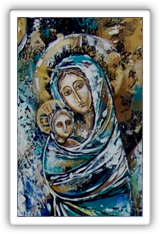|
|
Comprehending Medjugorje : Original Documents And Conversations with Arnaud Dumouch
Evaluation
Reference (French Edition) :
Daria Klanac, Comprendre Medjugorje : Regard historique et théologique, avec la collaboration du théologien Arnaud Dumouch, Informativni centar Mir, Medjugorje, en coédition avec les Éditions Sakramento, Paris, 2012, 2e éd. (1re éd. 2008, ISBN 978-2-915380-19-4 & 978-9958-36017-6), entretien avec le théologien Arnaud Dumouch, pages 186 à 188.
English Translation by Duško Čondić
Evaluation
Daria Klanac : My mother was a woman without any formal education. She was simple and generous. She listened to, and heard the word of God. She had a highly developed sense of evaluation, a gift of a truly healthy intellect. What is necessary for us ordinary faithful to be able to judge or carefully evaluate such that we do not fall into a trap of lies?
Arnaud Dumouch : Three properties, as called for by the Second Vatican Council, are important in order for a layperson to be a valuable aid in the spiritual lives of his brothers:
1. A straightforward and simple sense of reality: (such as that found in farmers and peasants, trans. observation), this is important so that one does not succumb too easily, and so that we might maintain a critical perspective.
2. A mature spiritual life: so as not to seek sensory pleasures and so that we might remain, before all else, linked to a spiritual relationship with God.
3. A simple, but realistic theology: a theology that will allow us to contemplate things rationally. We sometimes encounter this among ordinary laypeople. Herein, I am thinking of the mother of Saint John Bosco. She never allowed herself to become confused by her visions and premonitions. She always managed to reduce them to that which was essential: an active life of grace towards God and one’s neighbor.
We have an example of self-evaluation in the person of the man blind from birth who was cured by Jesus: he was replete with a sense of reason that was healthy, in fact, with a sense of irony as exhibited by him towards the High Priests when he told them the following: (John 9:10-11), “They therefore said to him, ‘How were thy eyes opened?’ He answered, ‘The man who is called Jesus made clay and anointed my eyes, and said to me: “Go to the pool of Siloe and wash,” and I went, and I washed, and I see.” This is a fact that does not avoid the question (property 1.).
We then go on to read (John 9:25), “The man responded: ‘It is strange that you do not know from whence he is, but he opened my eyes. We know that God does not hear sinners; however, if one is God-fearing and does His will, he will be heard. Never was it known that a person blind from birth would have his eyes opened. If this man were not from God, he could do nothing.’’” This is an expression of a simple but realistic theology that pokes fun at the consternation of the High Priests and at their irrational evaluation. (property 3.)
As regards the second property, if a spiritual consultant gives himself over to complete elation, he will thereby cease to be able to carry out his role. Hence, the behavior of Reverend Peyramale, the pastor in Lourdes at the time of the apparitions, was a very good example to follow since he distanced himself and remained realistic to the extreme.
D. Klanac : There always were true and false prophets. In our time, when a spirit of relativism rules, is it not far more difficult to recognize one that is true from one that is false such that we do not deceive ourselves?
A. Dumouch : No, it is not more difficult than previously. In all periods of history, even when Christianity was the common good of the majority of men in the manner that we today refer to as being “politically correct,” still, the majority of people preferred the apparent value of this world in relationship to that of the value of Christ. One only need remind himself of the time of Joan of Arc and of her martyrdom. To the contrary, as in all periods of time, the person who does not deceive himself is the one who truly evaluates that which is first in evangelical values, namely, love towards God and one’s neighbor. All of this leads to a humble acceptance of the disdain that comes from the world. In harmony with this principle, we can easily create a rather good image of the credibility of this or that apparition. With certainty, that spiritual instinct is not infallible. The behavior of Father René Laurentin, for instance, is one of good common sense: he is open-minded. He recognized the good fruits of Medjugorje. He investigates its consonance with dogmas of the faith. He befriended the visionaries. He inventories miracles.
